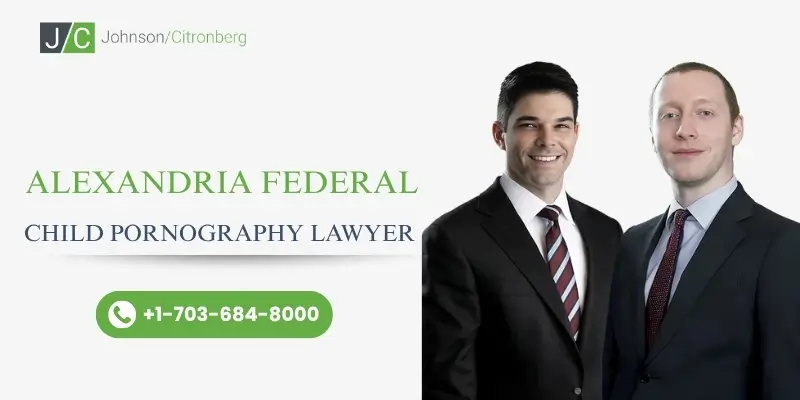Alexandria Federal Child Pornography Lawyer
Federal Child Pornography Attorney in Alexandria, VA
Accusations of criminal offenses that involve child pornography can be stressful and have a long-lasting negative impact on a person’s life. If you are facing such charges in Alexandria, a skilled federal child pornography lawyer can significantly impact the likelihood of a quicker and favorable resolution in your case. The legal team at Johnson/Citronberg, PLLC, knows how damaging these allegations can be, and our top priority is to defend each client aggressively.
Our attorneys are nationally recognized for their success in federal defense and collaborate with leading forensic experts and investigators to build strong, evidence-based strategies for even the toughest cases. From pretrial motions and expert testimony to trial preparation, we handle every detail with care. If investigators have already contacted you or seized your devices, knowing how to protect your privacy and reputation during a federal child pornography investigation can help you take the right steps immediately.

Federal Child Pornography Laws
State law and federal law prohibit the possession, distribution, receipt, and production of child pornography, which is defined as a visual depiction of a minor under the age of 18 engaging in conduct that is considered sexually explicit. It is important to note that this can also involve simulation, animation, or a depiction that has been altered.
Various formats are covered under the laws, including photographs, videos, pictures, computer files, and computer-generated images or videos.
Cases are generally charged as possession, receipt/distribution, or production/attempted production of child pornography. In general, production is the most harshly punished. Distribution, receipt, and possession are sometimes called non-production cases and are usually less severe. Penalties for conviction include up to 30 years in prison. Below are some of the details regarding different types of child sex crimes:
- Simple possession cases involve a person possessing a depiction of child pornography or child sexual abuse. In order to convict, the prosecution has to show that the defendant possessed the depiction, that the depiction involved a minor, that the minor was engaged in conduct considered sexually explicit, and that the depiction was transported across state lines.
- Receipt/distribution cases involve a person receiving an image or distributing the image to another person. Distribution is generally considered to be a more serious crime than receipt.
- Production/attempted production requires the prosecution to prove that the defendant used a minor to engage in conduct that is considered sexually explicit and that the conduct was intended for producing such an image.
According to the most recent report by the United States Sentencing Commission, in 2024, 45.8% of sentenced individuals in child pornography cases were for possession, 43.1% for distributing, and 11.1% for receiving. Also, 99.5% were sentenced to prison, and the average prison sentence was 115 months. A closer look at how federal courts calculate child pornography sentences shows the factors that influence punishment severity, including intent, quantity, and use of technology.
Possible Defenses Against Child Pornography Charges
In many criminal offenses, intent or knowledge is a critical component of guilt. For child pornography, the prosecution has to be able to prove the defendant knowingly possessed the sexually explicit image of a minor. An independent computer forensics expert can show that the defendant did not knowingly view or download the file in question.
In many cases, the defendant may be able to argue that he did not know the image or video was there. This is sometimes called an affirmative defense, which means that the defendants introduce facts to explain their actions. Common examples include:
- Accidental download. It is not uncommon for an individual to accidentally view or even download child pornography while seeking out adult pornography that is legal.
- Cache. When someone visits a website, all the images from the site are downloaded as temporary Internet files by default. When someone deletes an image or video, the computer often still stores a smaller version called a thumbnail. In general, just having a thumbnail is not enough to prove that a person knew the files were there.
- Another person was responsible for downloading the file. When multiple people have access to a computer, someone other than the defendant may have downloaded the file.
In other cases, improper law enforcement procedures can result in key evidence being excluded. For example, seizing a person’s electronic devices without a valid search warrant may render that evidence inadmissible in court. Working with your own computer forensics defense expert can help uncover technical errors, mishandled evidence, or digital inconsistencies that support your defense.
Additionally, if a defendant was not properly informed of their rights during questioning, any statements made could be suppressed. An experienced attorney can thoroughly review how evidence was obtained and build a strong strategy to challenge the prosecution’s case from every angle.
FAQs
How Is a Federal Child Pornography Charge Different From a State-Level Charge?
A federal child pornography charge is different from a state-level charge because a federal offense allegedly occurred between states or countries. This might include using the US Postal Service or other interstate carriers that were used to transport child pornography across borders. Cases involving the internet almost always fall under federal jurisdiction.
Can You Get a Plea Deal in a Federal Case in Alexandria, VA?
Yes, you can get a plea deal in most federal cases in Alexandria, VA. In general, your attorney can negotiate with federal prosecutors to avoid trial and get a reduced charge or sentence for their client. However, a plea deal may not always be available in every case, depending on several factors, such as the charge, total counts, defendant’s prior criminal history, and more.
What Agencies Typically Investigate Federal Child Pornography Cases?
Agencies that typically investigate federal child pornography cases include the Federal Bureau of Investigation (FBI), the US Department of Homeland Security (DHS), and the Department of Justice (DOJ). Depending on the case, there may be other agencies involved as well, including the Internal Revenue Service (IRS), military agencies, or local law enforcement.
What Penalties Can Result From a Federal Child Pornography Conviction in Alexandria, VA?
Penalties that can result from a federal child pornography conviction include prison sentences, significant fines, and sex offender registration. Conviction also means a permanent criminal record that can make it difficult to find housing and employment and affect other important parts of your life. Your criminal defense attorney can tell you about the likely penalties in your particular case as per the Virginia law.
Hire a Federal Child Pornography Lawyer
If you’re facing federal charges related to child pornography, the first step is to hire a criminal defense lawyer with a solid track record of success in similar cases. Contact Johnson/Citronberg, PLLC, today to schedule a consultation.



